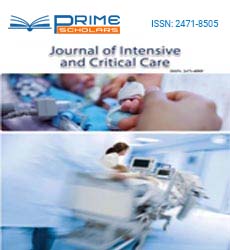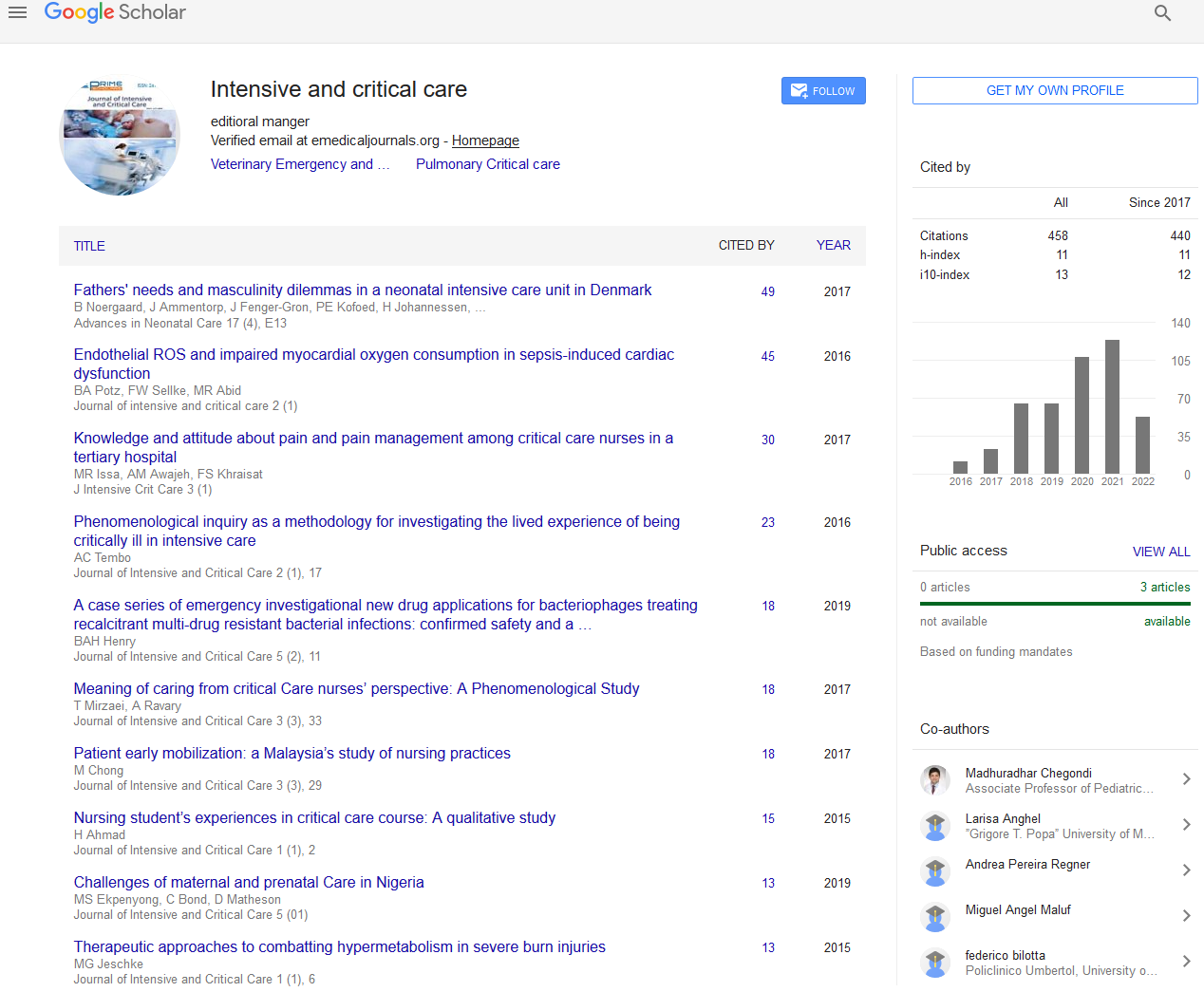Short Communication - (2022) Volume 8, Issue 7
Advances in Critical Care Management of Patients Undergoing Cardiac Surgery
Mohsin A. Zaidi*
Department of Anesthesiology, University of Cincinnati College of Medicine, USA
*Correspondence:
Mohsin A. Zaidi,
Department of Anesthesiology, University of Cincinnati College of Medicine,
USA,
Email:
Received: 28-Jun-2022, Manuscript No. IPJICC-22-14069;
Editor assigned: 30-Jun-2022, Pre QC No. IPJICC-22-14069 (PQ);
Reviewed: 14-Jul-2022, QC No. IPJICC-22-14069;
Revised: 19-Jul-2022, Manuscript No. IPJICC-22-14069 (R);
Published:
26-Jul-2022, DOI: 10.35248/2471-8505.8.7.91
Introduction
The Shands CTICU rotation includes the assessment, evaluation,
and management of critically ill patients with cardiothoracic
disease of a predominantly surgical nature and post-operative
critically ill cardiothoracic patients. Patients seen during this rotation
have a variety of common and rare cardiothoracic surgical
critical care conditions affecting one or more organ systems.
Patients may be admitted from the surrounding community or
transferred from another facility for tertiary level care. In this
rotation, fellows will have deep exposure to the care of critically
ill patients with cardiothoracic surgical conditions. Grantees
of this service participate in the initiation and coordination of
the patient assessment and management of the service. Grantees
will have the opportunity to perform intubation, bronchoscopy,
thoracotomy, percutaneous tracheotomy, central venous
access procedures, and arterial line placement on this rotation.
Fellows are expected to see thoracic surgery in the operating
room and gain more appreciation for surgical approaches to
thoracic disease [1]. If necessary, scholarship holders may treat
cases of cardiac and vascular surgery in the operating room.
Grant recipients will assist in coordinating consultations within
CTICU and interacting with counseling services to implement
assessments and treatment recommendations. Professionalism
and willingness to assist requested providers are always
expected. Grant recipients allow families to discuss treatment
plans, response to treatment, and prognosis [2]. Cardiothoracic
surgery faculty meet with fellows and extenders to provide
guidance and training, and to supervise procedures as needed.
Description
Multidisciplinary management of critically ill patients is part
of good clinical care and an integral part of this rotation. Fellows
interact with and coordinate care with cardiothoracic surgery, various surgical specialties and subspecialties, cardiology,
nursing, respiratory therapy, pharmacy, social work, nutrition
and physical therapy [3]. This highlights the importance of critical
care physicians working with cardiac surgeons to ensure
a successful outcome after complex cardiac surgery. Many institutions
have adopted this intensive care model in their Cardiac
Surgical Intensive Care Unit (CSICU), but as the shortage
of cardiac surgeon’s approaches and the demand for trained
and experienced critical care physicians increases, more it is
expected that the facility will be established [4]. As a result of
this changing environment in healthcare, cardiac surgery and
intensive care medicine is evolving into an important sub-area
of intensive care medicine that requires specialized knowledge
and experience [5]. Critical care physicians come from a variety
of backgrounds, each offering unique and valuable skills, but
with varying levels of experience working with this patient population.
However, for critical care physicians to be successful in
this expanding role, they must have a thorough understanding
of the physiological consequences of cardiac surgery, knowledge
of surgical anatomy, and how to perform actual surgery
in the operating room [3]. You must understand. In the United
States, there are only two specialized critical care training
scholarships for cardiac surgery, and most of the training is delegated
to the General Critical Care Training Program.
Conclusion
Many critical care graduates start immediately; spend a significant
portion of their clinical time in the CSICU, creating a transitional
period with its own challenges. At the University of Texas
at San Antonio, we have developed an innovative Cardiac Surgery
Critical Care Curriculum to address these unique challenges
and equip you with the fundamental skills and knowledge
needed to be successful and active in the CSICU. The curriculum
also includes providing the trainee with an understanding of the Society of Thoracic Surgeons (STS) quality/performance
indicators that are important to cardiac surgeons, hospitals, and
patients, and that the graduate will assume a leadership role in
her CSICU]. In response to this need, CHEST is expected to play
a leading role in this field in the coming years and advance education
in cardiac surgery and critical care.
Acknowledgement
None.
Conflicts of Interest
The authors declare no conflict of interest.
REFERENCES
- Seco M, Martinez GJ, Edelman JJ, Ng HK, Vallely MP, et al. (2015) Combined total-arterial, off-pump coronary artery bypass grafting and transaortic transcatheter aortic valve implantation. Int J Cardiol. 201:587-589.
[Crossref] [Google Scholar] [PubMed]
- Nearman H, Klick JC, Eisenberg P, Pesa N (2014) Perioperative complications of cardiac surgery and postoperative care. Crit Care Clin. 30(3):527-555.
[Crossref] [Google Scholar] [PubMed]
- Zhu F, Gomersall CD, Ng SK, Underwood MJ, Lee A (2015) A randomized controlled trial of adaptive support ventilation mode to wean patients after fast-track cardiac valvular surgery. Anesthesiology. 122(4):832-40.
[Crossref] [Google Scholar] [PubMed]
- Jakob SM, Ruokonen E, Takala J (2000) Assessment of the adequacy of systemic and regional perfusion after cardiac surgery. Br J Anaesth. 84(5):571-577.
[Crossref] [Google Scholar] [PubMed]
- Lannemyr L, Bragadottir G, Krumbholz V, Redfors B, Sellgren J, et al. (2017) Effects of cardiopulmonary bypass on renal perfusion, filtration, and oxygenation in patients undergoing cardiac surgery. Anesthesiology. 126(2):205-213.
[Crossref] [Google Scholar] [PubMed]
Citation: Zaidi MA (2022) Advances in Critical Care Management of Patients Undergoing Cardiac Surgery. J Intensive Crit Care. 8:91.
Copyright: © 2022 Zaidi MA. This is an open-access article distributed under the terms of the Creative Commons Attribution License, which permits unrestricted use, distribution, and reproduction in any medium, provided the original author and source are credited.

